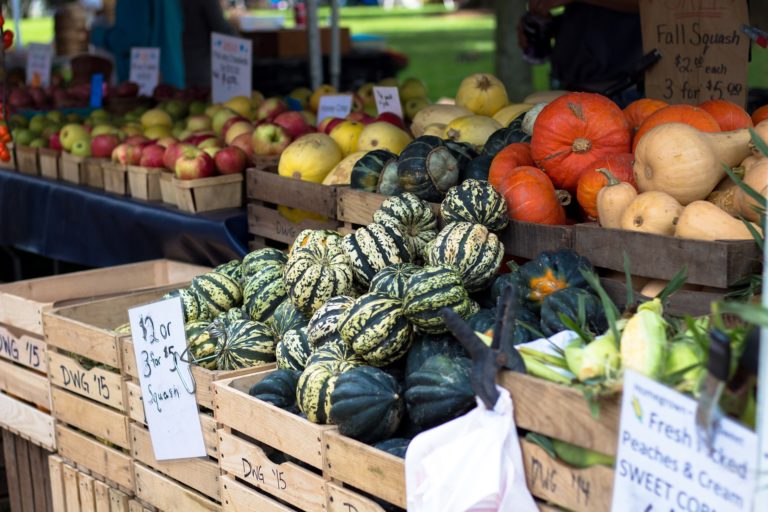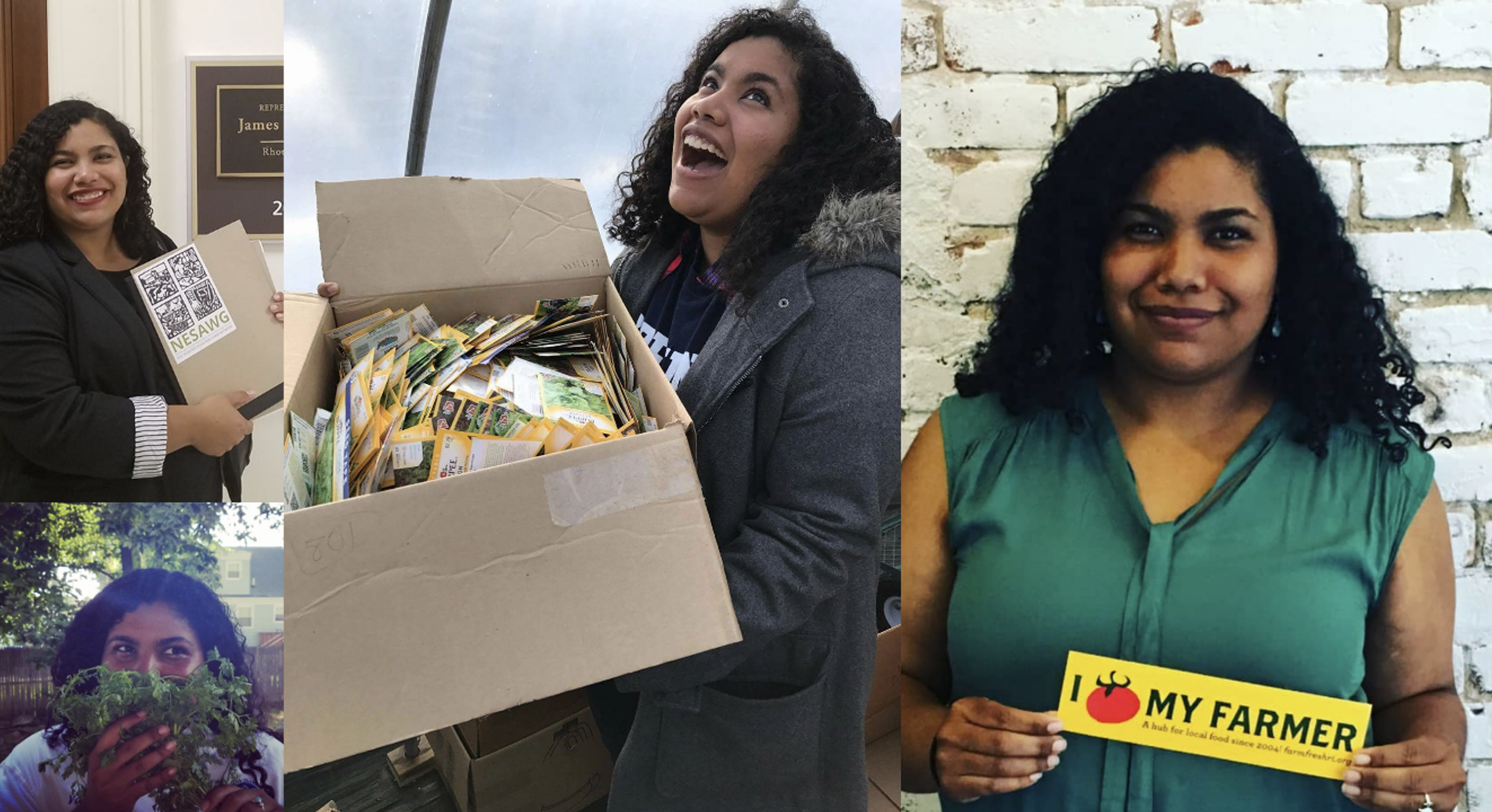
Vanessa García Polanco is a federal policy associate at the National Young Farmers Coalition, as well as a member of the boards of the Agriculture, Food & Human Values Society and Michigan Food & Farming Systems. She was recently appointed the North America Youth Focal Point to the UN Major Group for Children and Youth in support of the UN Food Systems 2021 Summit. García Polanco earned her master’s degree in community sustainability from Michigan State and a bachelor’s in Environmental and Natural Resource Economics from the University of Rhode Island. ESAL interviewed García Polanco about her trajectory to becoming a recognized activist-scholar for equitable, sustainable agriculture and food supply systems in Michigan and beyond.
DR: How did you first get interested in sustainable agriculture?
García Polanco: I was born and raised in the Dominican Republic (D.R.) in the town of Moca, the hub of the agricultural Cibao Valley. Everyone in my family worked in agriculture or related trades. Even when my nuclear family was not actively farming anymore, we still owned land, and relatives were still farming.
DR: So your interest began in your country of origin?

García Polanco advocates for equity and access in food systems.
García Polanco: Yes, but then I emigrated to the U.S. at age 15 with my family. In Rhode Island, I couldn’t help but notice differences in how agriculture was practiced. There are family farms in the U.S., but the way we produce and access food is really different.
DR: Could you give me an example?
García Polanco: In the D.R., the “mercado” is a loud, interactive event. I grew up knowing the farmers, the small business owners, and their history. The farmers’ markets here are different, as they have different goals. Here, people get most of their food from a supermarket. In contrast, where I grew up we barely went to a supermarket because we could supply our needs in the huge farmers’ markets. Produce came in from towns all over the region.
DR: What was it like for you emigrating to the U.S.?
García Polanco: At first, it was rough. As an immigrant, I felt cultural dislocation. I missed the familiarity of my life in the D.R. Although I had studied English in school, I needed practice.
DR: How did you adapt?
García Polanco: I credit a program called the North Providence Youth Commission, which gave me the opportunity to volunteer for the Office of the Mayor. Though I was only 16, I ran the small business program and promoted shop-local values. In the D.R., we had always shopped from small businesses, so I was familiar with the business concept. I got to know the community in my new town and found it really exciting.
DR: Did your role on the Youth Commission lead to other opportunities?
García Polanco: It led to my coordinating the local North Providence farmer’s market for a couple of years! I wasn’t thinking about my career so much yet, but was interested in environmental issues such as sustainable development, and that means at the community level. I brought my family to the farmers’ market to buy quality fresh produce, support the vendors, and interact with my community outside in the fresh air.
DR: You mentioned before that U.S. farmers’ markets have a different feel than Dominican markets. What do you attribute that to?
García Polanco: The U.S. farmers’ market that I managed was less tied to food access and security. It was more of a cute thing we did on Fridays than a food security and food supply opportunity. It was fun, but frustrating in that regard. My philosophy about sustainable food systems really took root there. I tried to influence the market mission towards one that met basic food needs, for example by allowing the use of food coupons, and encountered barriers. What I did learn was how to manage projects, and I benefited from interactions with community members and elected officials.
DR: By the time you went to college, you were already motivated to pursue a path around food policy?
García Polanco: College was formative in my understanding of food systems. I did agricultural outreach for the Cooperative Extension in Rhode Island, educating people on environmental stewardship. Because Rhode Island is not a big farming state, that mostly meant teaching local gardening, composting, and other environmental subjects. I was immersed in techniques for growing food, but noticed that there were no Latinos or people of color coming to my classes. Nor had there been any Latino or other minority farmers in the farmers’ market. I was also one of the few people of color in my university program of environmental economics. That got me to wondering about equity and access.
DR: How did you channel some of your learning and teaching towards equity issues?
García Polanco: I started to reflect on who’s affected most in terms of local food sustainability. In Providence, which is 30 percent Latino, and RI, which is 13% foreign born, I was tasked with delivering a program in horticulture and environmental stewardship. An initial assessment – interviewing community leaders and organizations serving Asian Americans, African Americans, and other ethnic groups – revealed that they needed something more interactive than classes. We offered a culturally relevant festival that welcomed the whole family: cultural groups performed traditional folklore dances; garden tours by region allowed people to find plants from their home countries; and activities for kids included geographic connections, like a table for Asian-American activities. I got interested in how we develop culturally competent education in environmental stewardship.
DR: How have these experiences influenced your own cultural identity?
García Polanco: I am a young, Latinx immigrant millennial living in the U.S. who cares a lot about the environment, food, and agriculture. It took awhile for my family (and myself!) to understand my college major and the job I wanted to do. My aunt would just say, “Vanessa works with plants.” My mom would say, “You can take a girl out of the country, but you cannot take the countryside out of the girl.” Though my dad is still a farmer in the D.R., my family was confused about my interest in agriculture. It took a few years, but now my family is completely on board with my passion. We spend our family time in farms and nurseries. Agriculture allows me to stay connected to my culture or origin and keep our whole family grounded.
DR: How about “community?” How do you define it for yourself?
García Polanco: I see my community in all the places I have lived. My community includes other people doing food sustainability work, particularly around decolonizing the food supply. In the U.S. and the D.R., there are equity issues in agriculture. For example, out of 47,000 farms in Michigan, only several hundred Black farmers show up on the USDA’s agricultural census. That is both because Black farmers are hugely underrepresented, and also because of USDA access issues. A lot of farmers of color don’t have access for geographical and cultural reasons. For example, they may not meet the criteria established by the USDA for a farm operation on detailed bookkeeping and record keeping, so there is a cultural disconnect on expectations and how to run and manage farm businesses. This bureaucratic system was not designed for non-Caucasian farmers who may have language or education barriers.
DR: How does that relate to your recent Policy Memo on Michigan Farmers of Color and the Future of Sustainable Food Systems?
García Polanco: I saw the opportunity to put together recommendations to the Michigan Department of Agriculture and Rural Development. I reached out to some fellow women of color in food justice advocacy to draft the policy memo about achieving racial justice in sustainable agriculture. For example, Black farmers in Michigan have declined because of a historically racialized agricultural system. The memo recommends creating an incentivized farm program to ensure land access and reduce racial disparities.
DR: What farming trends are particular to Latinx famers in the U.S.?
García Polanco: In places like Michigan, Latinx farmers are growing. Many other states are reporting more Latinx farmers transitioning from other food systems roles. I have grave concerns about what it will mean for immigrant farmers in food systems. A lot of Latinx and non-Latinx immigrants work in warehouses, packaging, and farm labor, but not in governance and policy of the food systems.
DR: Why aren’t more Latinos and people of color in those leadership positions?
García Polanco: I have had a lot of privileges, in terms of education and opportunity, that have allowed me to be where I am. Many immigrants do not have those privileges. I know many Latinx people and people of color doing great work at the grassroots level. It’s important to realize that you don’t have to be in Washington, D.C., to be a powerful advocate There are many ways at the community, local, and state level to be a stakeholder. You might feel uncomfortable because you will be the first, or one of the few Latinos, immigrants, or women forging the way. You cannot be afraid to be the first.
DR: Do you have suggestions, particularly for Latinx and female scientists, on how to get involved in policy?
García Polanco: I would say to just start telling your story. It wasn’t until about three years ago that I really felt comfortable explaining why I am doing this, embracing my identity as an immigrant woman in science and agricultural policy. Don’t wait so long to get comfortable. Be present, be loud, bring your full authentic self.
DR: Where did you get your courage?
García Polanco: I tried lots of things for which I did not feel ready. Also, people opened the door to me; they added an extra seat to the table. I found great mentors. I also realized that I could share my voice on Twitter, where lots of policy conversations happen. Through Twitter, I pushed myself to get more involved in conversations about policy and being a public activist- scholar.
DR: Where do you picture yourself in 20 years?
I want to be doing more political education as it relates to engaging people of color in food systems policy and governance. Long term, I definitely want to be doing more transnational work between the U.S. and D.R. I am always learning from one of my greatest inspirations - Saudi Garcia and Ysanet Batista about connecting our food justice work to doing decolonial work in the D.R. I also really want to buy my grandmother’s land in the D.R., where I grew up on weekends watching the plantains growing and getting my first taste of agriculture. I want to keep my Dominican roots.
Do you have a story to tell about your own local engagement or of someone you know? Please submit your idea here , and we will help you develop and share your story for our series.